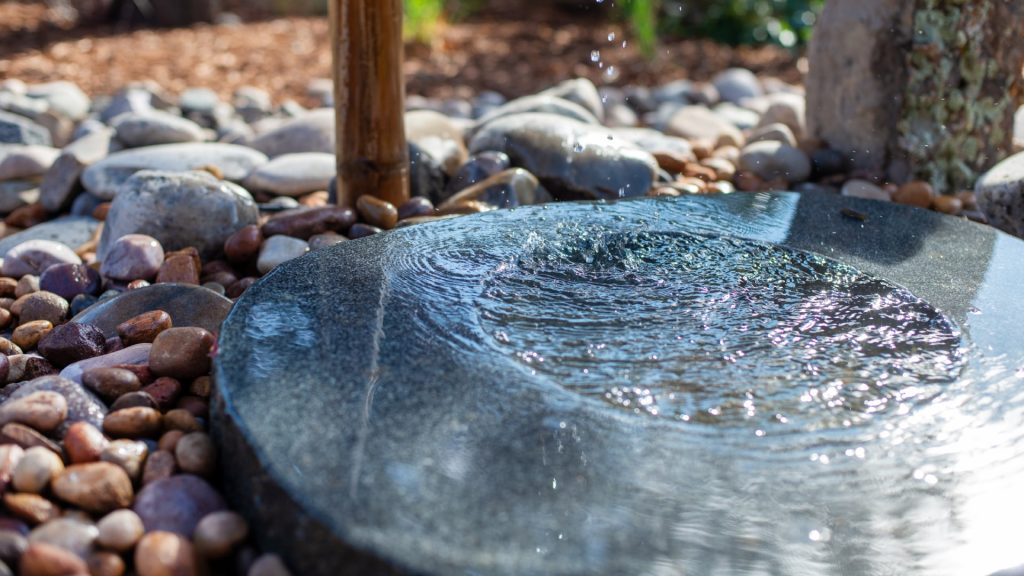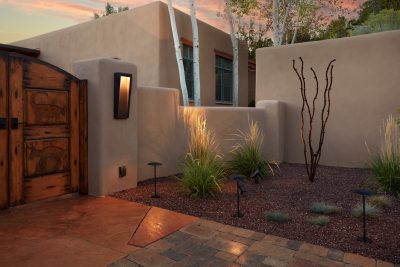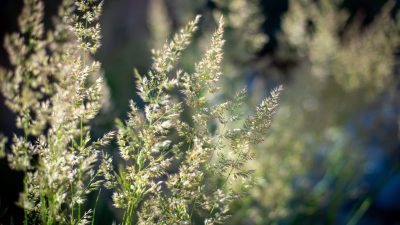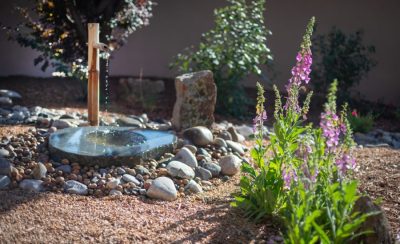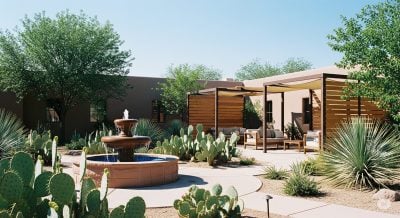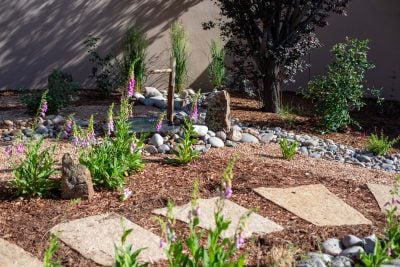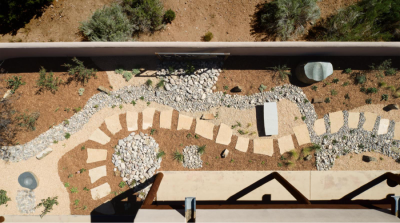Desert Landscape Ideas: Key Takeaways
- From rock beds and a cactus corner to a romantic pergola and succulent garden, desert landscaping can make your outdoor space attractive and functional
- Desert landscaping enhances curb appeal, conserves water, and reduces maintenance
- To build a sustainable, cost-effective garden, focus on layout, drought-tolerant plants, and hardscape features
- Drip irrigation, mulch, and occasional pruning keep your desert garden healthy and vibrant year-round
It’s Monday and your back is sore. You spent the entire weekend dragging hoses in the garden and fighting off weeds. On top of it all, your water bill just landed, and it’s anything but low.
Have you considered desert landscaping?
We’ll share:
- Seven inspiring desert landscape ideas
- Benefits of desert landscaping
- What to consider when building a desert landscape
- Practical tips to help you maintain your garden or backyard
7 Desert Landscaping Ideas for Your Outdoor Space
Looking for inspiration? Here are some creative ideas you could use to transform your outdoor space into a breathtaking oasis.
1. Succulent Garden
Succulents store water in their leaves, stems, or roots, which allows them to thrive in dry conditions with minimal watering.
With their diverse shapes, colors, and sizes, succulents can be a great addition to your front or back yard.
The pointed leaves of agave will make an impressive focal point, while the fleshy leaves and vibrant flower spikes of aloe will enhance the beauty of your landscape.
Use various colors of echeveria to shape backyard borders or add sedum for a versatile ground cover.
2. Rock and Gravel Beds
Rock and gravel beds can make beautiful pathways or decorative elements. When used around plants, they provide a clean and modern look.
One creative option is to mix rocks, gravel, and pebbles of different sizes. You can also use river rock for this purpose. Arrange the larger stones at the base and place gravel on top.
Add decorative boulders to catch the eye, and put a finishing touch with metal, plastic, or stone edging to keep rocks in place.
3. Cactus Corner
A cactus corner can become an intriguing central place, combining cacti in various forms, from tall and columnar to short and round.
Their bold silhouettes and structures will add a touch of the exotic and rugged beauty of the desert to your outdoor space.
Select a variety of cacti like towering saguaro with arm-like branches or round barrel cactus, for a touch of symmetry.
Plant them in a sunny spot with good drainage and add decorative rocks around: this will enhance their beauty and reduce moisture evaporation.
4. Drought-Tolerant Flower Beds
Dreaming of a colorful retreat that adds unique character to your yard? Craft flower beds with desert marigold, blanket flower, and penstemon.
Desert marigolds will dot your garden with bursts of yellow, while blanket flowers will bring a fiery contrast of red and orange, like a summer sunset in bloom.
Add the pink, purple, and red tubular flowers of penstemon and you’ll get an elegant landscape that turns heads.
5. Shade Structures
Shade structures offer relief from the intense heat and sun rays. Choose a pergola if you want to create a stylish semi-shaded outdoor living area or a large, shade sail if you need to cover a spacious patio or dining area.
Go for durable materials like steel that can withstand the harsh New Mexico climate, resist rust and corrosion, and provide long-lasting support and protection from the sun.
For additional shade and greenery, plant climbing plants like wisteria or trumpet vine.
6. Container Gardening
Container gardening is perfect for small spaces, patios, or areas with poor soil, as containers can accommodate a variety of plants, allowing for easy movement and rearrangement.
Mix different sizes and materials to accommodate various plants, from small succulents and herbs to larger shrubs.
Keep thirsty herbs near water and let your sun-loving succulents soak up the rays on the patio ledge.
A pro tip: Use clay pots for a classic, rustic look, or larger metal or ceramic containers to create statement pieces.
7. Desert Grove
Want to create a cool retreat in hot weather?
Why not combine a mix of trees and shrubs like mesquite and Texas Ranger.
Mesquite will provide a dappled shade with its delicate, fern-like leaves, while Texas Ranger will create beautiful contrasts with its showy purple blossoms.
Space your trees and shrubs at an ample distance so they have enough space to grow and display their beauty.
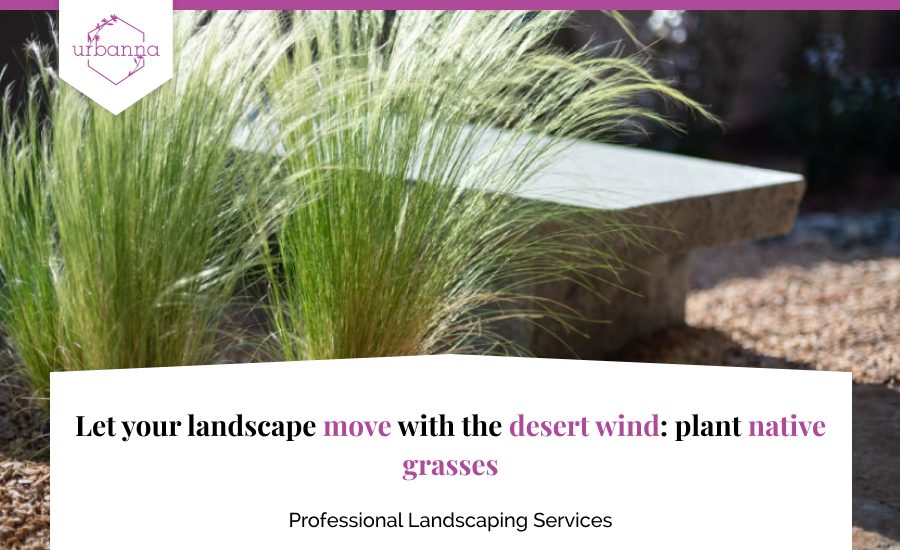
Understanding Desert Landscaping
Desert landscaping, or xeriscaping, is a garden design style used in arid and semi-arid environments.
With a focus on water conservation and low maintenance, it uses drought-tolerant plants and efficient irrigation systems to create a sustainable and aesthetically pleasing landscape.
Top Reasons Homeowners Choose Desert Landscaping
You should consider desert landspacing if the climate where you live is characterized by significant temperature fluctuations and limited rainfall. These conditions turn maintaining traditional lawns into a challenge, especially when there’s no extra irrigation.
These are the top reasons homeowners are making the switch to desert landscaping.
Water Conservation
Thirsty traditional lawns are not a practical choice in areas where rain can be rare.
Desert landscaping drastically reduces water use, which helps conserve this precious resource.
Low Maintenance
Desert landscaping uses plants that are well-adapted to harsh conditions and require minimal care, such as succulents, cacti, and native shrubs.
They don’t need mowing, watering, or fertilizing. In addition, mulches and ground covers help suppress weeds, further reducing maintenance tasks.
The result? You get a beautiful space without the weekend upkeep.
Aesthetic Appeal
Desert landscaping creates a unique blend of colors and textures that stands out from common green lawns.
Add rocks, gravel, and boulders, and you’ll enhance their striking charm, creating a serene and inviting atmosphere.
Cost Savings
Sure, rocks and native plants may cost a bit upfront, but they’ll save you months of water bills and weekend labor down the line.
You’ll save even more as drought-tolerant plants are long-lasting and don’t need frequent and costly replacement.

Key Elements To Consider When Planning Your Desert Garden
To create a thriving and cost-effective landscape with lasting value, consider the following important factors.
Layout
For small backyards, use vertical elements like trellises and container gardens that maximize space and create a lush, layered look.
For larger front gardens, opt for open pathways, sculptures, and combinations of plants that enhance the visual impact and create diverse garden areas.
Plants
Select drought-tolerant plants that are native to the hot climate. Use a harmonious mix of textures, colors, and varied heights to create a captivating and dynamic garden that invites exploration.
Soil Preparation
Test the soil pH and use additives to make sure it will keep your plants healthy and growing.
Use organic matter, sand, and gravel to improve drainage and prevent water accumulation.
Apply a layer of mulch around plants to keep moisture, regulate soil temperature, and reduce weed growth.
Irrigation Strategies
Consider using a drip irrigation system or soaker hoses to deliver water directly to the roots,which will minimize water waste and ensure efficient moisture distribution.
Hardscaping
Incorporate hardscaping elements. These can be gravel beds, a flagstone patio, an outdoor fireplace, retaining walls, rock gardens, and decorative stones.
With the right mix, your fire pit, gravel path, and stone patio will look like part of your desert landscape.
Maintenance Tips for Your Outdoor Space
Caring for a desert landscape means you must address its unique needs to maintain both health and beauty, including:
- Watering: Skip the daily sprinkles, while giving your plants a deep drink only now and then. Early mornings are ideal: this time of day will reduce evaporation and allow absorption of water before the heat of the day.
- Pruning and trimming: Remove dead or damaged parts and maintain their shape. This will improve air circulation and promote healthy growth. Avoid excessive pruning, which can stress plants and reduce their resistance to harsh conditions.
- Weed control: Use mulch to suppress weeds, which otherwise will join in the competition for water and nutrients. If they still appear, remove them by hand.
- Fertilization: Use minimal quantities of fertilizer, as desert plants like low-nutrient soils. Fertilize during spring and early summer when plants grow and avoid fertilizing during the season when they rest.
- Pathway and hardscape: Inspect pathways and hardscapes for signs of erosion or shifting. Keep hardscape surfaces clean and free from debris to prevent accidents and maintain a tidy and attractive look.
Create a Beautiful Desert Landscape With Urbanna Landscaping
At Urbanna Landscaping, we specialize in transforming outdoor spaces into beautiful, sustainable, and functional areas.
With a deep understanding of Santa Fe’s unique climate and natural beauty, we offer a wide range of landscaping services, including Santa Fe-tailored landscaping, xeriscaping, irrigation, and lighting.
Whether you’re looking to create a lush desert oasis, a modern front yard, or another innovative design, Urbanna can make your dream come true.
We’ll walk you through every step, from the first sketch to the final LED lamp, making sure your vision comes to life, the Santa Fe and Urbanna way.
FAQs About Modern Desert Landscape
How can I design a small desert garden?
Use vertical elements, container gardens, and tiered planters to maximize the use of your space. Incorporate compact plants and ground covers to create a beautiful appearance on several layers.
How can I make my front yard look modern in a desert landscape?
Start by playing with clean lines: geometric walkways, sleek outdoor furniture, and bold plant shapes bring a fresh, modern edge.
Can I include a lawn in my desert landscape front yard?
Traditional lawns are not common in desert landscapes. However, you can use drought-tolerant grasses or artificial turf to create a green space. These options require less water and maintenance while still providing a lawn-like appearance.
What elements can I use to create a focal point in my desert garden?
To establish a focal point, use a standout plant like a large agave or saguaro cactus, or introduce an eye-catching feature such as a fire pit, sculpture, or water element. These additions draw attention and enhance the overall interest of your garden.
- What’s Included in a Residential Landscaping Project in Santa Fe? - September 26, 2025
- Desert Landscape Ideas: Modern, Drought-Tolerant Designs - September 25, 2025
- Drought-Tolerant Landscaping Ideas for Low-Maintenance Yards - September 23, 2025
